As I was getting set up to interview Spider-Gwen: Ghost-Spider writer Seanan McGuire at the recent Jet City Comic Show in Tacoma, WA, something great happened. A pair of fans approached McGuire’s table, young ladies in their late teens or early 20s (I’m terrible at estimating ages). They didn’t have anything for McGuire to sign; they just wanted to tell her how much her novels meant to them, in particular one of the series she writes, and how much they’re looking forward to the next book in the series (I did not clearly catch which series it was, but I believe it was the Hugo and Nebula Award-winning Wayward Children series—McGuire has multiple fantasy novel series with forthcoming books in early 2019). Without missing a beat, McGuire turned and reached into the bag on the floor next to her, pulled out a softcover book, and handed it to one of the fans. The young woman’s eyes widened; it was an advance copy of the next book in the series she loved. She stammered an excited thank you and the pair wandered off, and it was clear to see their days had been made.
As first impressions go, that simple act of kindness and shared enthusiasm was a pretty good indicator of what chatting with McGuire was going to be like. In addition to being a prolific writer with dozens of novels under her belt (not to mention the aforementioned awards), McGuire is clearly a fan through and through, and it’s easy to imagine a similar situation to the one I witnessed having happened to her in the past, but with her on the other side of the table. When it comes to her work for Marvel Comics—since August she’s had two X-Men-related one-shots along with the first issue of Spider-Gwen: Ghost-Spider—it’s obvious that McGuire has brought that enthusiasm with her to comics. In the course of our nearly half-hour chat, we discussed transitioning from prose into comics, her approach to writing Gwen Stacy, and how she feels about having her dream job.
Joe Grunenwald: Is this your first convention as a comic book writer?
Seanan McGuire: No, it’s not. I was at New York Comic Con earlier this month. That was after the release of the X-Men Gold Annual #2 that I wrote for Kitty Pryde, but before the release of both X-Men Black: Mystique and Spider-Gwen: Ghost-Spider.
Grunenwald: In general how have you found the reception between writing comics versus writing prose?
McGuire: Comic fans are very intense. I know this because I am a comic fan, I have been one my whole life, but comic fans are very intense and they are not shy about asking very specific questions on social media platforms, at which point I have to go, ‘Y’all, Marvel has snipers and I like my job, you know, could you chill a little bit?’ But it’s delightful. It’s so nice. I was a folklore major in school and I actually wrote a couple papers on the idea that comics, especially ongoing superhero epics, are sort of the Gilgamesh of our modern age. They’re these tales told by so many hands that when you think of the characters you can’t necessarily pick out who wrote which aspects, who introduced which aspects. They just grow and evolve and accrete all of these intrinsic traits that reflect the world we’re in. So it’s kind of like I’m finally a professional folklorist, it’s just got a lot more spandex than I expected.
Grunenwald: Specifically regarding Spider-Gwen, what draws you to that character? She’s a very complicated character.
McGuire: Ghost-Spider is super-complicated, which is impressive given that she was only introduced in 2014, but Gwen Stacy is a character that has been near and dear to my heart since I was a very small child. I grew up super poor in the state of California, and that means that my comic book reading was usually about 10 years behind what was new on stands, because I was getting the collections of the teenagers who had just gone off to college. Their mom sold them at yard sales and my mom brought them home for me. And I loved Gwen Stacy. She was smart, she was a science nerd. She got to hang out with Spider-Man but didn’t actually have to do stuff. And I just thought, ‘This character is magnificent. I’m going to follow her forever. And I don’t know who that redhead is on the covers that I see at the comic book store, but clearly she’s irrelevant.’ And then Gwen went off a bridge and I became very sad. It was genuinely heartbreaking. Spider-Man was the first comic to betray me.
And so when I heard about Spider-Gwen, when they said, “we’re bringing this character back,” it was the antithesis of “Women in Refrigerators.” It was ‘Yes, thank you, you have finally undone one of the greatest wrongs of comic book history.’ I never thought I’d get to write her. I didn’t think Jason Latour would ever step off to do anything else. I got an email from my X-Men editor, Kathleen Wisneski, who is also a Spider-office editor. And she said, “Hey, would it be cool if the Spider-office hopped on the phone with you for a few minutes?” I’m thinking they’re going to offer me another annual or something. You know, ‘Let’s do a one-shot about Peter Parker has a bad hair day,’ I don’t know. And instead what I get is, “Hi, how would you like to write for Gwen.” And I’m like, “Oh, you want to Gwen one-shot?” “No. No. How would you like to write for Gwen.” And then for a moment there was no air in the universe and I could see sounds and hear colors. I think I said ‘yes.’ I’m pretty sure I said ‘yes’ because I got the job. It was a very surreal moment.
Grunenwald: So what’s it been like to follow Jason Latour and Robbi Rodriguez on that book, since they’re the creators of that version of the character?
McGuire: I am trying really, really hard to be respectful to their run on the character and their vision for the character. I’m not sure that anyone could possibly have guessed when this started out how foundational she would become. She’s only been around for four years and yet, I don’t think they’re ever letting her go. I would say that she is with Miles Morales, she’s with Mary Jane in terms of, this character was introduced and now we will never be getting rid of her. So it has been an interesting balancing act between respecting this very self-contained run where they very clearly thought she was just going to be on Earth-65 and eventually they’d blow up Earth-65 and no one would have to deal with that anymore, and bringing her into the wider Marvel Universe. There’s a lot of stepping very carefully and occasionally some swears. I say a lot of swears in the privacy of my own home.
But it’s wonderful. I got to meet Jason—I actually met him at the American Library Association conference, about a month before the news was public. So we’re both under various Marvel NDAs. We can’t talk. And I’m trying to figure out if he knows. So I’m like, “Hey, I really enjoyed the last issue of your run.” “The last issues not out yet.” “I really enjoyed the last issue of your run,” [holds middle and index fingers to palms] spider-hands, spider-hands, spider-hands, “You know I work with Marvel, right?” “Ooooh, let’s go sit in a corner and talk very intensely about Spider-Gwen for an hour while not ever actually saying that out loud.” And it was great. He’s such a sweet guy, he’s been so supportive. He was really excited that they hired a female writer because he had said that he wanted whoever took over for Gwen to be a woman if possible, because she is one of our few strongly solo female superheroes. So it’s kind of important to have that experience of the world approaching the character, and to reassure readers.
I’ve had, just since the first issue came out, more than ten parents come up to me, both mothers and fathers, and let me know that they’ve added Ghost-Spider specifically to their teenage daughters’ pull lists, to their daughters aged between 12 and 16. And I asked a couple of them, “Why did you wait?” Gwen is Gwen. I didn’t create Gwen—I wish I had, but I didn’t. And the answer, somewhat disappointingly, has been, ‘Because now that there’s a woman writing it, we can be absolutely sure you’re not going to run out of ideas and have her sexually assaulted.’ Which is not to say that Jason would ever have done that, there’s no implication in his run at any point that that was on the table. But I understand the concern on the part of parents. You know, the fact that you’re OK with a superhero violence level for your 12-year-old doesn’t mean you’re OK with a sexual violence level. So it is important, I think, to have some of that reassurance when you’re writing an all-ages comic, which Ghost-Spider really is. It’s not a kids comic, but it’s also not ‘Venom/Carnage-Land Meets The Punisher.’ It’s in that middle zone where you want to be able to use it to get teenagers reading and to get them to be a part of your greater comic universe for the next 40 years.
Grunenwald: It’s a reasonable concern given Gwen’s history. She was dropped off a bridge, and then they retconned a relationship with Norman Osborn for her that’s super-icky, so it’s not outside of the realm of possibility that someone would run out of ideas for her and decide that that was the logical next step.
McGuire: In the schema of story that we’re given in the modern day, that is one of the cheap and easy ways to show that someone’s a bad guy, is that they threaten someone sexually.
And you get tired of it. It’s boring. It’s not only upsetting for some people. And especially when you’re thinking about that 12-year-old who you’re trying to bring into comics forever. Maybe that’s the first time they’ve seen it. Maybe you have that kid that super-identifies with Gwen, and suddenly their self-insert into this greater Marvel Universe is being threatened in a way that they are not comfortable with. But, it’s just dull. You can’t do the same thing eight hundred times and expect it to have the same emotional impact.
Grunenwald: Gwen is sort of having a Moment right now, too, between, obviously, the new series and then in other media there’s Marvel Rising and she’s going to be in the Into the Spider-Verse movie, so she’s got a higher profile now arguably that she’s ever had before. Has there been any pressure as a result of that, coming onto the character and having to keep that momentum going?
McGuire: My editors are amazing. I love them. And they hired me because they were reasonably sure I could keep that momentum going. Most of the pressure is internal. When you’re a novelist and represented by a literary agent, one of the first things they’ll do is sit you down and say, ‘Where do you see your career going?’ And this is because if you say ‘I want to be the next J.K. Rowling,’ they want to be ready to kind of talk you down. That’s the ‘No, no, honey, let’s be reasonable’ conversation.
When my agent sat me down for that conversation ten years ago, I said, “I want to write the X-Men.” And she went, ‘Excuse me?’ And I said, “I need you to make me famous enough that they will let me write the X-Men.’ So writing for Marvel is my life’s dream. This is what I’ve been working toward all this time, so there’s a huge amount of pressure but it’s all internal. I’m very aware that I’m making canon. And yes, it could get retconned tomorrow. It could get wiped out of existence. Whatever. It will still have been a part of the canon. My first Marvel comic was the X-Men Gold annual with Kitty Pryde, and I literally wrote the description for the first panel and started crying because these were canonical trees. So I think my editors will tell me if I ever get too far off the beaten track in terms of, ‘No, we need her to stay a certain level of appealing,’ but so far I’ve been pretty good. And at this point they’ve had me, I’m writing the ongoing comic, but they also had me write the video comic that we did to introduce Gwen’s place in Spider-Geddon, And I wrote a Spider-Gwen story for the Marvel Superhero Adventures that’s releasing this [past] week. So they’re really very much, ‘If Seanan wants to do everything with Gwen, we’ll let her,’ and I appreciate that enormously.
Grunenwald: You mentioned a little bit about coming from prose. How’s the transition from writing prose to writing comics been for you?
McGuire: So this is going to sound a little weird—as if everything else I’ve said has sounded perfectly normal—but I’m kind of obsessed with structured poetry. I was that terrible, terrible kid in your high school English class that wrote a sonnet every single day for the entirety of high school. My English teachers started just giving me a blanket, ‘If I offer you 100 points of extra credit will you not make me read the poetry.’ Which was fine, I wrote the poetry anyway, but it worked out. And structured poetry has all these rules. You are trying to get your point across in an octet or a decatet or fourteen lines. You have to follow the rhyme scheme, you have to follow the breaking points.
Writing a comic script is like writing a 20-page long structured poem. You have very similar space restrictions. You have very similar levels of rules. You have to have superhero action or it’s not a proper issue. You have to have identifying captions to tell people who the characters are, because, while that’s a little repetitive for the familiar reader, you need to assume that at least one person has picked up this issue who has never seen these characters before. So it’s been remarkably smooth. This is not my first comics work. I did a creator-owned project with Thrillbent a couple years ago called The Best Thing. Never name a comic The Best Thing, you cannot Google it to save your life, but I thought the title was clever and in context the title was clever. It’s sort of a ‘Magical girls meets Carrie’ thing. It’s very brutal and unpleasant and I love it.
My editors, again, are great. I got a note back from one of my editors this last week saying, ‘I need you to reduce this script by 15 percent.’ That’s it, just tighten it. And he was right. But that’s also a part of structured poetry. Sometimes you write your lines with a couple extra syllables, because you know you’ll be able to go back later and find a word that shortens it to the right length. You just need to get that image down on the page.
Grunenwald: That’s interesting, and comics is much more collaborative, at least as far as the creation process goes. What’s it been like working with artists, and editors that have more of a hand in it probably than I would imagine fiction writing would?
McGuire: With artists, there is a pattern of learning to trust that has to come in there. My first work with an artist will almost always be more thoroughly described than my second or third at this point. Rosi [Kämpe], who’s in Finland—she’s my artist on Ghost-Spider and she’s delightful—Rosi barely needs me to tell her what’s going on, just who’s in the panel and what. I try to focus very hard on only identifying the elements the artist must draw.
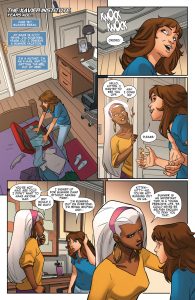
Again back to that Kitty Pryde annual, it’s very important that Kitty respects her Judaism. And she is one of our few very central, absolutely canonically Jewish comic book characters. We have some where it’s questionable, ‘are they Jewish or are they not, it’s never nailed down.’ Kitty wore a Star of David at all times for the first four years she was in comics. So in the description of her dorm room there’s a mezuzah on the door frame because it would be there. So mostly I said, ‘it’s a dorm room, you do you, but there’s a mezuzah on the door frame and a picture of Doug Ramsey on her desk.’ And those things are important to both the character and the setting. My artist for that, Marco [Failla], who is delightful, but he did ask, ‘How precious is she about her words? Can I change the angle she’s described things as being?’ And I’m like, ‘Of course you can, you’re the artist, it’s your job. It’s my job to tell you who’s punching who, but it’s your job to make that cool.’ I’ve been really lucky with my artists. So far they’ve all been absolutely delightful, very willing to listen to me, and to understand that if I say, ‘It’s a room, but there’s a cactus,’ the cactus is there for a reason, and it’s probably going in someone’s eye on page 15.
Grunenwald: In your first issue of Spider-Gwe-, er, Ghost-Spider, sorry, that’s the official title—
McGuire: The official title is Spider-Gwen: Ghost-Spider, because we’re still in that transition period codename-wise.
Grunenwald: Right. So in the first issue you’ve had to incorporate elements of Spider-Geddon. How’s that been for you?
McGuire: It is a great way to hit the ground running! My first four issues are technically Spider-Geddon tie-ins. I don’t think I could have handled it, I don’t think I would have survived if they had asked me to be quiet about [writing Ghost-Spider] until the first issue hit, but I do feel like you lose a little bit of the impact of Gwen ostensibly dying in issue 2 of Spider-Geddon when you immediately roll into Ghost-Spider. How cool would it have been if we could’ve just dropped that? But of course with Previews and the ordering system that’s just not possible. But it’s also reassuring. You know—and I don’t feel this is a spoiler because I’m committed to 12 issues and that’s public—you know Gwen is making it through Spider-Geddon alive. You know Miles is making it through Spider-Geddon alive. And that has helped me. I am comforted by that knowledge.
I’m mostly outside of Spider-Geddon. Obviously you’ve read Issue 1 to be asking specific questions. Gwen is doing what would be called a bottle episode on a TV show. She’s someplace far away from her friends. She is being very much informed by Spider-Geddon. She’s in a panic. Her friends are in danger, she’s trapped in this new dimension, she doesn’t have her Web Watch. She doesn’t know if she can get back to them in time. If you’ve read Spider-Geddon you know we’ve already had a couple of deaths. So, how many people are going to die while Gwen is benched? How many people could she have saved while she was benched? That has been a very hard drumbeat through these four issues. It’s been a coordination thing, but it’s an important coordination thing, and I kind of like that we’re just going for it. Otherwise, given where the Latour/Rodriguez run ended, otherwise it’d be Gwen sitting around going, ‘Welp, I’m not in jail anymore. Now what do I do? I’m allowed to have shoes with laces! This is cool!’
Grunenwald: A thing that I liked about the Latour/Rodriguez run on Spider-Gwen was that it didn’t seem like there was really a status quo. It was constantly shifting and the ground was always falling out from underneath Gwen. And in the beginning of your first issue it seems like Gwen’s sort of trying to find a new normal, and then of course Spider-Ham shows up and it’s all out the window again. Is Gwen ever going to catch a break?
McGuire: [laughs] Well…she had a burger! I’m very glad she finally got her burger. I don’t think that it’s in Gwen’s nature to catch a break. Peter Parker has terrible luck, and Gwen Stacy has a constantly shifting idea of what normal is. Now I do think that she has found some serenity from taking a year and paying. Every spider has their ‘arc words.’ Peter’s are “With great power comes great responsibility,” obviously. But for Gwen we’re going with “You get what you pay for, you own what you build.” And she is working very hard at paying for what she wants, and making sure that she can be as stable in her life as possible. True stability is boring, so she’s never going to have that absolute stability. But I would like her to be a little less confusing because we are bringing in all these kids. I think we’re going to have a big rise in younger readership of all the Spider-titles after Into the Spider-Verse. And I would really like them to be able to pick up a Ghost-Spider issue and not feel like they’re watching an episode of Community.
Grunenwald: Outside of Gwen, you’ve mentioned already your X-Men work and that you wanted to be famous enough to be able to write the X-Men. What appeals to you about those characters and that world?
McGuire: When I was a kid, the X-Men were the first comic characters I encountered who were kind of my age. Not all of them but we had enough teenagers. And so I invested, and I invested the way that people have always invested in soap operas, the way that you invest in All My Children or the World Wrestling Federation. I have been following them my whole life. I know them. I know they’re not real, I know that they’re not actually people, but I also know them and I care about them and I care about, you know, ‘Did Scott get Rachel off to school on time?’ I just love them so much. They’ve been so important to me. They’ve been so foundational to me.
I feel like they are best when they are being written by someone who actually loves them. Because it’s easy with any superhero to go into the silliness of it all. And even the silly characters, even characters like Gwenpool or Deadpool or Spider-Ham work best when they are being written from a place of sincerity. For them, the world is the way the world is. The X-Men, they’re my guys.
Grunenwald: Do you remember what your first X-Men comic was?
McGuire: My first X-Men comic was the issue of New Mutants where Doug Ramsey gets shot. And the fact that they were able to make me care about that. Even though I had no idea who this kid was. Just from Rahne, Wolfsbane, just from Rahne freaking out and crying, it was obvious this was big and important and they were friends. They cared about each other. They had weight behind their relationships, and I wanted that.
Grunenwald: I want to ask you specifically about your Mystique one-shot. I loved the angle that you took with her of looking at her as an actor. I feel like I’ve never really seen that before and I thought that was really interesting. How did you get into that mindset? Because she’s sort of a super spy but also talking about the craft of acting throughout the issue.
McGuire: I view Mystique less as a super-spy and more as the single best grifter the world has ever known. If I turned into you—
Grunenwald: I’m sorry. [laughs]
McGuire: Well, if I turned into you my dress would fit weird. But if I went and found your very best friends, they would know immediately that I wasn’t you, because there is so much of being a person that is stance and affect and mannerism and speech. For Mystique to do her job as well as she does, she basically has to be one of those phony psychics that cold-reads their audience. She has to be able to adjust on the fly, and that’s not a part of her powerset. She gets your voice, she gets your appearance, she doesn’t get you. And we see her continuously winning at things as if she gets you. That has to take work. I did a lot of acting in my teens and early 20s. I did a lot of theater classes, I did a lot of improv classes, and I met people who were on the border of Mystique-level skill. Not with transforming themselves, obviously, but with transforming the way you see them. So that was sort of the approach point that I took. How much work does she have to do, and how much of her spare time does she spend practicing those techniques on an unwitting populace for funsies.
Grunenwald: That’s cool that, having acted yourself, you could bring that personal perspective to the story. Do you have any other X-Men work in your future that you can talk about?
McGuire: No. Marvel is very, very good about controlling the flow of information, and I respect that because they understand the flow of information better than I do. Like, they don’t tend to do big announcements at San Diego Comic Con because they get buried in everything else. So I hope to have more X-Men work and when I do you will eventually hear about it from Marvel directly.
Grunenwald: How far in on writing Ghost-Spider are you?
McGuire: I have turned in issues 1, 2, 3, and 5; 4 is the last of my Spider-Geddon tie-in issues. And Spider-Geddon isn’t fully locked, so the exact nature of that issue is going to depend partially on the events of Spider-Geddon, but I should have that done within the next week, and then I will get plowing merrily forward.
Grunenwald: You said you’re locked in for twelve issues—do you have any plans beyond that?
McGuire: I very, very, very much want to keep doing Gwen. I’m having such a wonderful time. I love everyone at the Spider-office. And I’m really happy that reviews have been solid. People seem to really enjoy the issue, they enjoy the direction for the character. Our sales have been good, at least based on every comic book store I know selling out.
Grunenwald: The first issue sold out at the distributor, there’s a second printing coming…
McGuire: Yeah. I’m super-excited about that. So I’m hoping they’ll let me do more. I’m absolutely hoping they’ll let me extend my twelve to either fourteen or sixteen, because my first four issues are Spider-Geddon, so I don’t have two trades of material left in my run. I’ve got slightly too much for one trade, and not quite enough for two trades. So we’re trying to convince them to give us just a couple additional issues on the back of that first twelve-issue order to make sure that we can fit a two-trade structure But right now—and obviously I have a lot of ‘New Relationship Energy’ with this title and my editorial office, I’m just having the best time—right now I’d sign up for 5 years if they’d let me. Just come on, let me kick the tires on this baby and show you how fast she can go.
Both Spider-Gwen: Ghost-Spider #2 and the second printing of Spider-Gwen: Ghost-Spider #1 are due in stores November 28th.


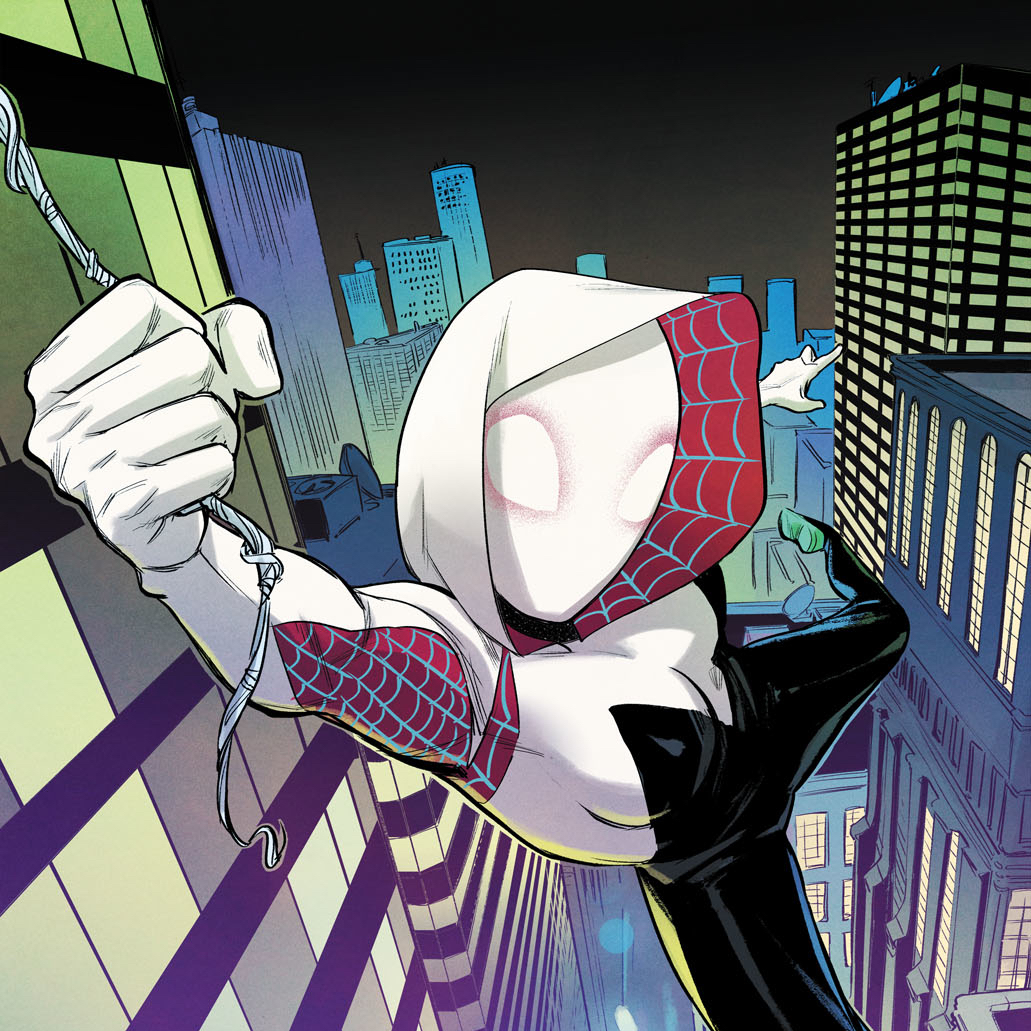

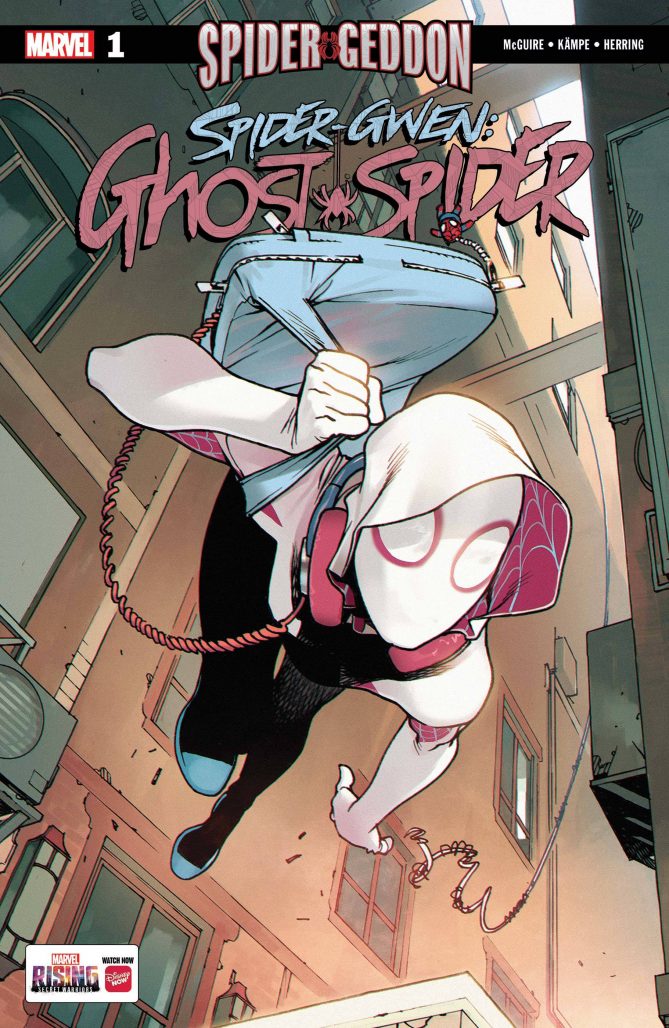
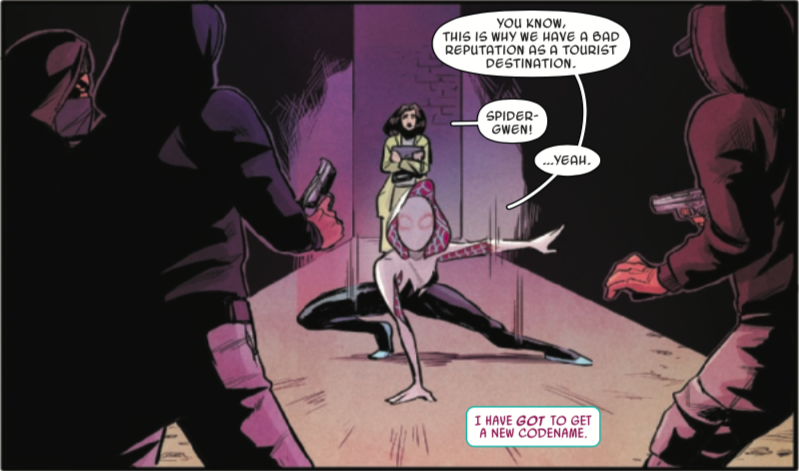
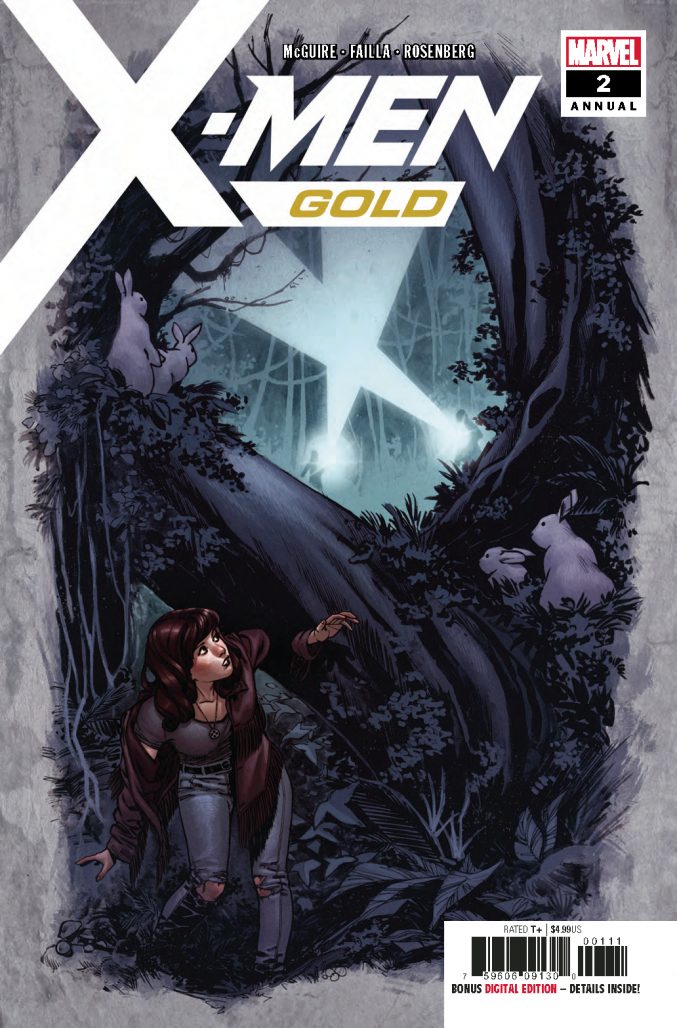
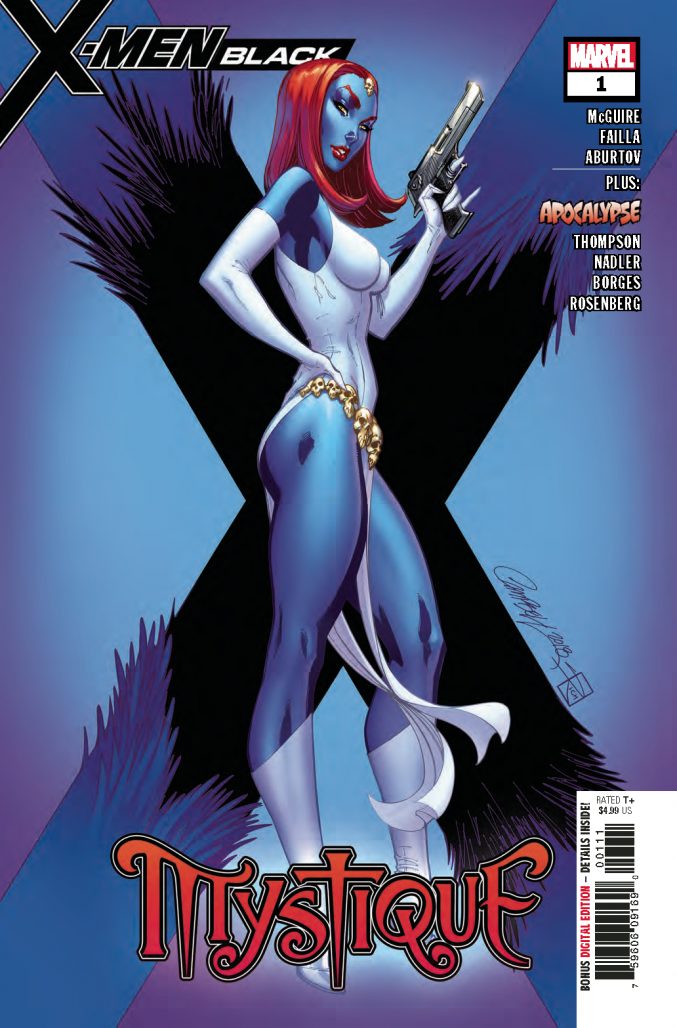
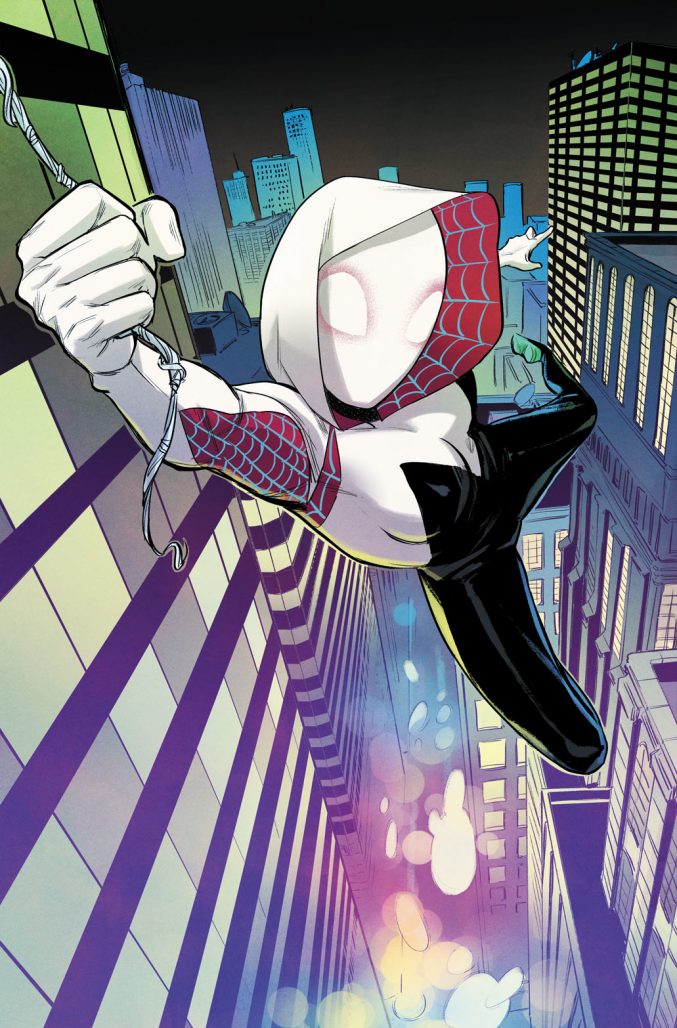

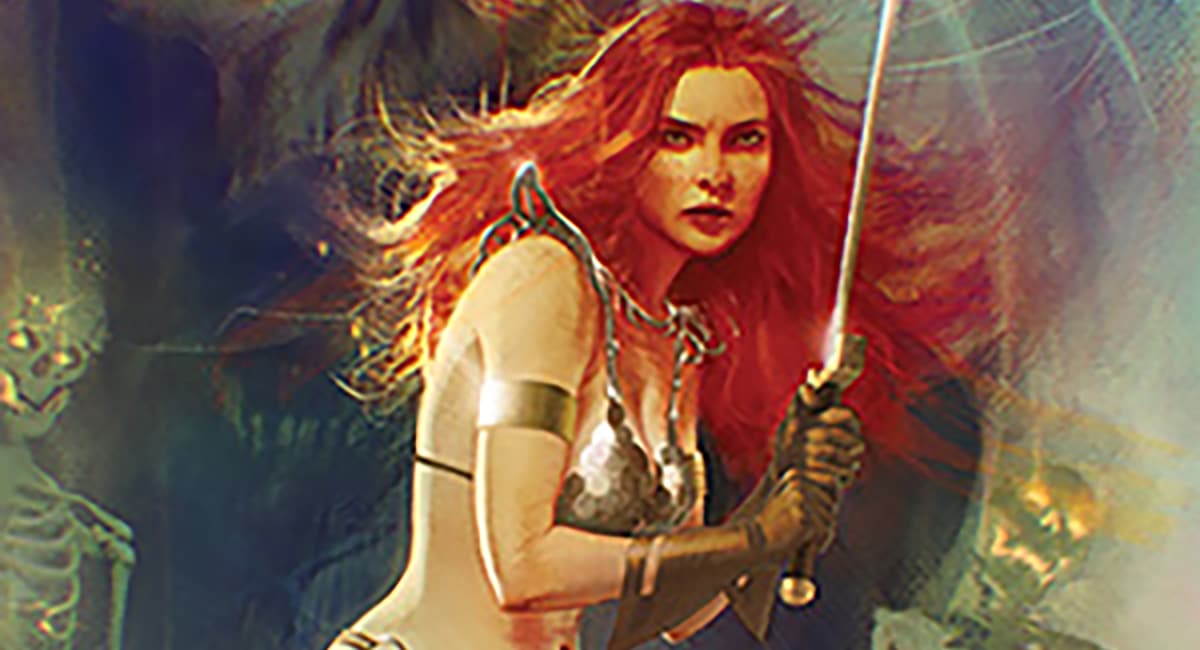
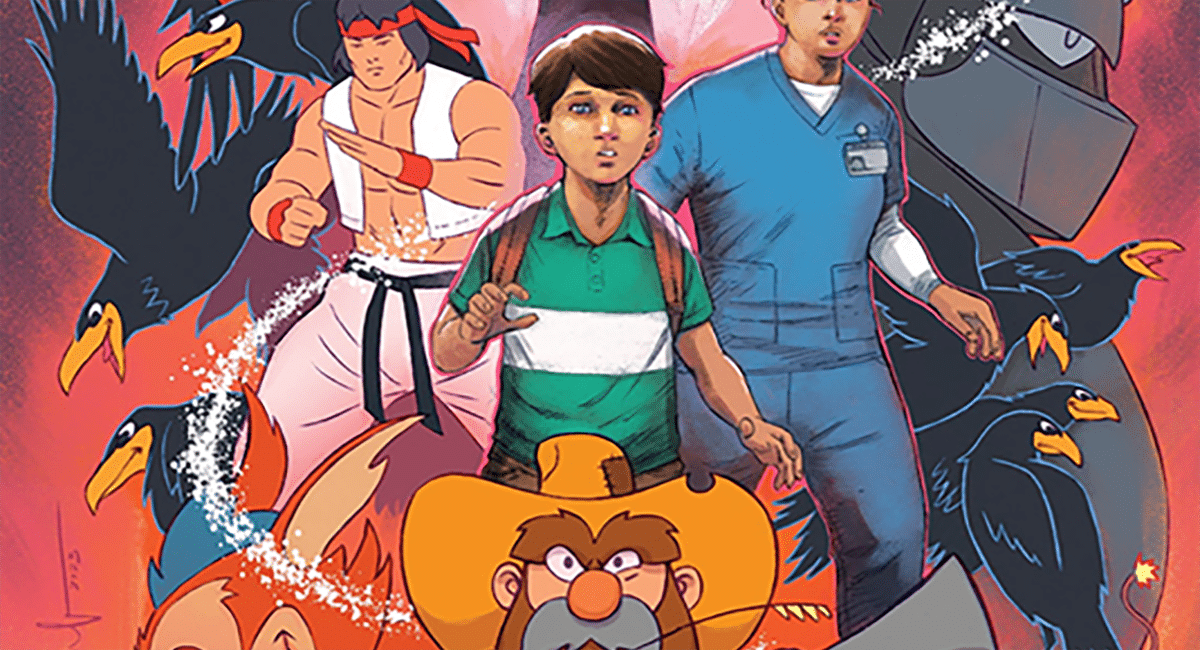



Comments are closed.